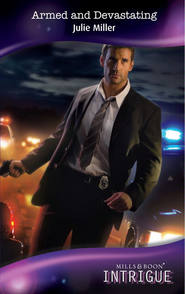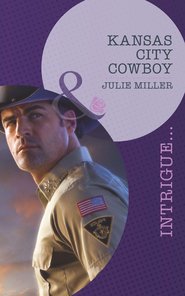По всем вопросам обращайтесь на: info@litportal.ru
(©) 2003-2025.
✖
Riding the Storm
Автор
Год написания книги
2019
Настройки чтения
Размер шрифта
Высота строк
Поля
Nate plucked at the collar of his dark blue uniform shirt and settled his cap down over his short, dark hair. He turned his focus back to the older man beside him. Enough self-analysis. His personal life might be in a state of flux right now, but his work had always been there for him. And right now, his work was here in Texas. As self-appointed leader of this band of volunteers, it was his responsibility to have all the facts in place so their team could make the most efficient use of the supplies they’d brought, and utilize their skills and talents where needed most.
“It was my understanding that the hurricane’s due to make landfall sixty miles northeast of here.” Nate didn’t have to be psychic to sense the older man’s tension. “But you sound as if you’re expecting casualties.”
“I’m expecting anything and everything,” Mitch said. “You should, too. My old bones are sending me a different message than the weather service.” Old was a figurative term, Nate decided. Mitch Kannon couldn’t be a day over fifty. And though he was apparently well-fed, the stocky fire chief was in good shape. “Mark my word. That storm’s gonna turn.”
“You think the hurricane will hit farther south, closer to us?” came an energized voice from the back seat. “Will we be able to see it this far away from the coast?” Dana Ivie, a firefighter and EMT who worked at the Courage Bay station with Nate, was known for her enthusiastic approach to her work. “I’ve never seen a hurricane before. Except on TV. Now I wish I’d brought my camera.”
Nate couldn’t hide his indulgent smile. He and Dana had shared more than one middle-of-the-night chat over a cup of coffee at the station house, relishing the excitement and bemoaning the hazards and heartbreaks of their chosen career. “You’ve never seen an avalanche or tornado before, either,” he teased. “Maybe you’d like to take the scenic route on the way back home.”
Dana laughed. “Very funny, Kellison. I’m trying to have a positive attitude here. I’m looking at this thing as an adventure, not a tragedy waiting to happen.”
“I hope you’re right.” Mitch didn’t sound convinced. He killed the siren and stopped at what appeared to be one of the town’s few traffic lights, then turned right past a sprawling brick building easily identifiable as a school. They slowed as they passed the football field and headed toward a residential area. “We plan to put up as many evacuees as we can here at the high school. If that doesn’t hold them all, then we’ll have to ask people to open up their homes. My brother-in-law, Hank, owns the hardware store downtown. He’s donated all the cots, sleeping bags, lanterns and water jugs he has on hand. Beyond that, the townsfolk have pitched in blankets and pillows and food. We kept some at the firehouse, but like I said, we’re nowhere close to being able to provide for a big influx of evacuees.”
“Sounds like you have a real sense of community here in Turning Point.”
Nate cocked his head to make eye contact with the brunette seated behind him. Cheryl Tierney, a trauma nurse from Courage Bay Hospital’s E.R., was as detail-oriented as Dana was impulsive.
“But if your evacuees are scattered all over town, we won’t have a reliable way to track them,” Cheryl pointed out in her ever-practical tone. “And since we’re not familiar with the area, we could be delayed trying to answer individual calls. Wouldn’t it make more sense for us to set up at the school instead of in town?”
Mitch shook his head. “I’ve scheduled a briefing for you down at the firehouse at 8:00 a.m. I’d like to ask you and Dr. Sherwood to set up a triage center at the station.” Amy Sherwood was the fourth volunteer from Courage Bay. “That’ll free up Kellison and Ms. Ivie to handle the more routine calls. I’ll give you a tour of our facilities, such as they are, and a map of the county. Right now, all our emergency calls come through the station, so we’ll use that as our command post. As we get the weather updates, we’ll have a better idea of what we’re facing and whether or not we need to move to an alternate site.”
“Will we be meeting your staff then?” Cheryl asked.
Mitch huffed a sound that wasn’t quite a laugh. “My staff consists of a dozen or so volunteer firefighters who are scattered around the county right now, shoring up their own homes and making sure their families are safe. We’ll see who shows up for the briefing.”
Volunteers. Who might or might not show up for duty assignments. Who might or might not be properly trained for the potential range of emergencies brought on by a hurricane.
Reassuring? Hardly. Nate stared out the window to hide his scowl. No wonder Mitch had had to call Chief Egan for backup. This had to be the craziest, most haphazard, seat-of-the-pants rescue operation Nate had ever been a part of.
Dr. Amy Sherwood, a first-year E.R. resident at Courage Bay Hospital, raised her voice to be heard from the third seat. “Chief Kannon, perhaps you could tell us a little more about what to expect, weatherwise, with a hurricane.”
“I will if you call me Mitch.” He paused to turn on the wipers, clearing the condensing moisture from the windshield. “Damon is classified as a category four hurricane. If he hits Corpus Christi and the northern Gulf Shore like he’s supposed to, we’ll miss the brunt of the one hundred thirty to hundred fifty mile-per-hour winds.”
“Whoa!” Dana’s expletive said it all. “Maybe I don’t want to see a hurricane, after all.”
Mitch answered with a told-you-so shrug. “Generally August gets pretty hot and sticky around here. But if you noticed the chill in the air, that’s the barometric pressure dropping ahead of the storm.”
That explained the ache in Nate’s knee.
“Joy and rapture,” Dana groaned.
Amy knew what had triggered the sarcastic remark. “Ah, yes. The barometric pressure drops and pregnant women near their term go into labor. Remember the storm that hit Courage Bay a couple months back? We delivered three babies in the E.R. that night.”
Nate remembered it well. He’d brought in one of the mothers who’d gone into premature labor. Mitch’s white-knuckled grip on the steering wheel warned Nate that their temporary boss didn’t find Amy’s story amusing.
“I hope to hell you’re wrong about that,” the fire chief muttered.
Mitch turned onto a wide road aptly named Main Street. Though it was nearly deserted at this hour of the morning, the number of businesses—in brand-new buildings as well as remodeled historic structures from the early 1900s—indicated this was the town’s commercial hub. A few of the storefront windows had been boarded up, but more had been left uncovered in defiance of the hurricane.
Or, in spite of Mitch’s gloomy prediction, in the belief that Damon would stay true to his predicted course and blow past this sleepy little town.
They passed a tiny, stone-walled library and redbrick post office. Then Mitch pointed to a two-story, whitewashed building with a Closed sign hanging in the window. “That’s our clinic. Generally, our maternity cases go into Alice or Kingsville. Or, if there are complications, we fly them up to Corpus Christi. But I don’t have an ambulance or driver to spare to take anyone anywhere right now. And nobody’s flying north. Nobody’s flying anywhere once the heavy rains hit. So no babies, got it?”
“We’ll tell the mothers to cross their legs until the storm blows over, okay?” Even Mitch smiled at Dana’s ludicrous suggestion.
As they stopped at a crossroads near the center of town, Nate turned the conversation back to practical information about the hurricane. He was feeling more responsible by the minute for his team’s response. “When you say heavy rains, how much are we talking about?”
The light turned green and Mitch drove on toward the half brick, half vinyl-sided building with lettering that read Turning Point Fire Department. “Six to ten inches, on average, from the outer bands or leading edge of the storm. Sometimes thunderstorms or even tornadoes spin off inland along the storm’s track as well.”
Mitch pulled into the parking lot in front of the building. He pointed out the garage doors marking the three bays where Turning Point’s emergency vehicles were stored. “We’ve got one ambulance and two engines, all fully-equipped. But most of our volunteers use their own vehicles when responding to a call. I’ll make sure you’re partnered up with someone who knows the area. Or I’ll let you use the Suburban and give you directions if it’s here in town.”
Parking by the front door, Mitch killed the engine. The first ominous drop of water plopped onto the windshield with a portentous splash. All five of them stared at the tiny puddle for an endless moment.
The storm was on its way.
Nate wondered if he should trust the dull throb in his rebuilt leg the way Mitch seemed to trust his instincts. If that was the case, he had a feeling this was going to be one very long, very wet day.
The second raindrop hit. Then the third. Soon there were too many to count. Like an alarm bell, the sudden change in weather spurred the five travelers into action.
Nate adjusted the bill of his cap low on his forehead and opened the door. The cleansing scent of ozone filled his nostrils as he inhaled a deep, recharging breath and mentally prepared himself for the anything and everything Mitch had warned them about.
He circled to the back of the Suburban and met Mitch, who’d opened the doors to start unloading supplies. A splash of rain hit the bill of Nate’s cap and dampened his cheek. The light shower seemed deceptively gentle. “Looks like things are pretty dry around here. I imagine a heavy rain could lead to some flooding?”
Mitch nodded, balancing three crates against his stocky chest. “The Agua Dulce River flows south of town, straight into the Gulf, so we might get some back-flow from the storm surge. Plus, we’ve got a web of lakes, creek beds and man-made irrigation ditches crisscrossing the farmland and ranches west of here. I’m expecting a few road washouts, especially in the countryside.”
“Is there high ground we should direct people to?”
“These are the flat, Texas coastal plains. High ground around here is the back of a horse or a rooftop.”
Nate was beginning to understand Mitch’s skepticism about Corpus Christi sending its evacuees to Turning Point. He grabbed three more crates and followed the chief inside, past the front office and dispatch room. Things weren’t improving. Both rooms stood dark and empty. Where was Mitch’s crew? This had to be the craziest disaster preparedness setup he’d ever seen.
Mitch flipped on a light switch as they entered a large room, which appeared to be a general meeting area. Cabinets, shelves and a small kitchenette lined one wall, and tables and chairs were scattered about the room. Following Mitch’s direction, Nate set the crates down on one of the countertops and followed the chief back outside, passing Dana, Cheryl and Amy in the hall along the way. Each carried equipment and supplies.
“I can read the doubt in your eyes.” Mitch might be a blustery worrywart, but Nate had already realized he possessed a lot more depth than his good-ol’ boy facade let on. “You’re thinking we’re some backwash little town with more heart than common sense.”
“I didn’t say—”
“I’ll have you know we’ve got an ample supply of both.”
Mitch shoved a couple of paramedic kits into Nate’s hands. “We aren’t as slick an operation as Dan runs back in California. We don’t have the resources or the personnel that you’re used to. And, yeah, I’m worried. This is my town and these are my people who are at risk.”
He picked up the last kit himself and closed the vehicle doors. When Mitch stopped to look him in the eye, Nate realized the barrel-chested man stood as tall as his own six feet. “But make no mistake. We’re tough here in Turning Point. Resourceful. My staff might not have your formal training or wear a uniform or keep a regular schedule. But when the chips are down, you can rely on ’em.”
The pride and certainty in Mitch’s tone and posture brooked no argument. Whatever doubts this man had about the storm—about the next several hours of this dull, drizzly day—he had none regarding the people of his community.
Nate wasn’t sure if the chief’s remarks had been a dressing-down or a pep talk, but he got the idea.
Maybe he should have a little faith, too.











